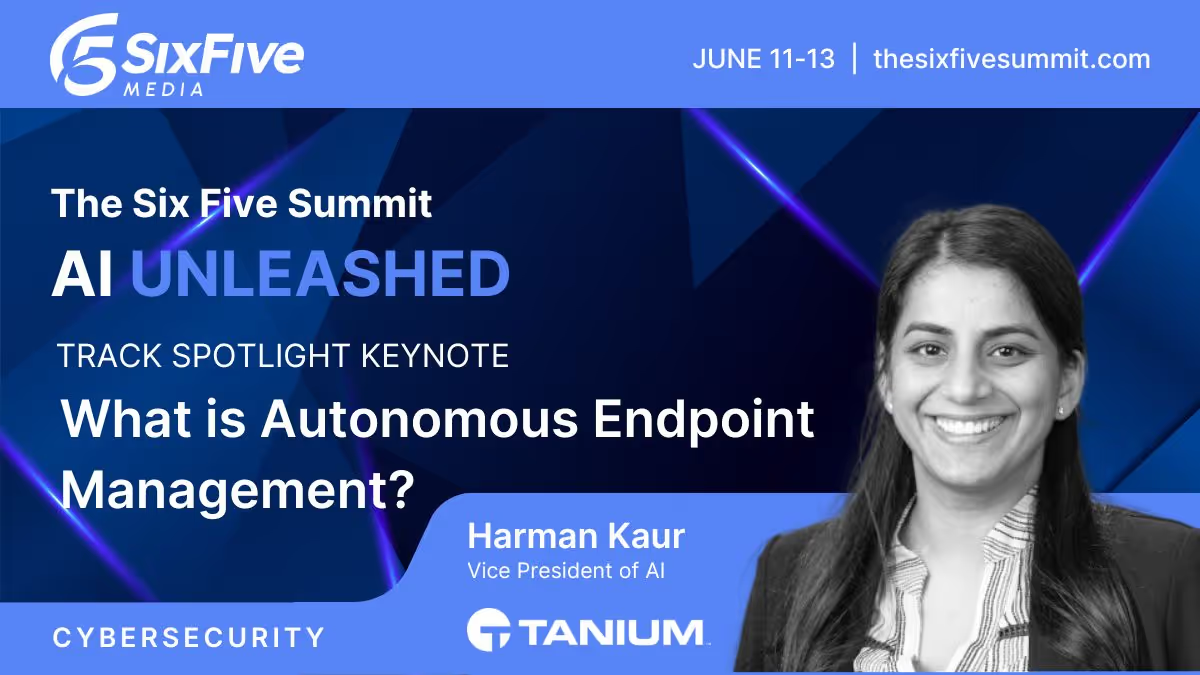Beyond 5G: AI, Innovation, and What’s Next for Telecom
Dawood Shahdad, VP at Boost Mobile, and Dr. Srinivas Bhattiprolu, Head of Advanced Consulting Services at Nokia, join host Will Townsend to discuss how AI and innovation are reshaping telecom—from new revenue streams to trust and transparency in automation.
How will artificial intelligence shape the future value proposition and operational landscape of telecommunications?
Host Will Townsend is joined by Boost Mobile's Dawood Shahdad, VP, Core Network & Innovation Labs, and Nokia's Dr. Srinivas Bhattiprolu, Head of Global Presales and Advanced Consulting Services, for a conversation on how AI, innovation, and the next wave of technology advances are reshaping the telecom industry. Discover how next-gen telecom, AI, and innovation are driving transformation across business models and customer engagement.
Key Takeaways:
🔹Redefining Telecom's Value: Executive perspectives on how artificial intelligence is moving the telecom sector beyond traditional services to unlock new revenue streams, leveraging data-driven opportunities.
🔹The Rise of AI-Powered Services: A look into which emerging AI capabilities are poised to become as transformative as 5G, providing predictions on what will drive significant growth and change in the industry.
🔹Balancing Automation with Trust: An in-depth analysis of practical approaches for implementing AI-driven automation effectively while maintaining the critical pillars of customer trust, transparency, and security.
🔹Bold Innovations for the Next Decade: Forward-looking insights on the most disruptive innovations that will reshape telecom network operations and business models, charting a course for the future of the industry.
Learn more at Nokia or Boost Mobile
Watch the full video at sixfivemedia.com, and be sure to subscribe to our YouTube channel, so you never miss an episode.
Or listen to the audio here:
Disclaimer: Virtual Webcast is for information and entertainment purposes only. Over the course of this webcast, we may talk about companies that are publicly traded, and we may even reference that fact and their equity share price, but please do not take anything that we say as a recommendation about what you should do with your investment dollars. We are not investment advisors, and we ask that you do not treat us as such.
Will Townsend: Thanks for tuning into this Six Five Media Virtual Podcast. I'm Will Townsend. I manage the networking and security practices for Moor Insights and Strategy. Today, I'm joined by Boost Mobile and Nokia executives. We're talking about the transformative impact of artificial intelligence in the modern day and how AI is driving change in customer engagement, operations, monetization and future business models. So, Srini, Dawood, it's great to be talking to you today.
Dawood Shahdad: Great to be here. Thank you.
Will Townsend: Dawood, let's start with you. And so from Boost Mobile's perspective, how is AI going to redefine the core value proposition of telecom operations in the next decade? And that's a long time in the tech industry, but we'd love to get your insights.
Dawood Shahdad: It is a long time in the tech industry, but definitely a pretty long time in the telco industry. So again, a great first question to start with and I'm happy to share my perspective on this. So, for the most part, you know, not just 5G, if you go back to 4G and 3G, you know, the telecom operators have become nothing more than just connectivity providers. Right? AI, if we enable it the right way, it's going to enable us as operators to not just be the connectivity providers, but also become the intelligent service enablers and also strategic technology partners. Right. I expect that within the upcoming decade. AI is not going to just help us optimize the networks, it's also going to help us create new business models and services that are deeply integrated in our daily lives and the lives of our consumers, as well as the operational workflows for our enterprises. So again, there's a lot of hype about AI, but I say it's not really hype. AI is real and it's here.
Will Townsend: It certainly is. And your point is well stated that, you know, in the past, you know, right, wrong or indifferent, it was all about access. Right. To your point, in the 3G and the 4G world, I think with 5G and standalone, we're beginning to see a shift in that. And that is a good thing because companies like Boost Mobile make significant investments in infrastructure and spectrum and you need to reap the rewards of that. But it also delivers tremendous value to customers. So, Srini, I'd love to get your insight. From Nokia's perspective, where do you see the potential for AI to unlock revenue streams in telecom beyond just access?
Dr. Srinivas Bhattiprolu: I think there, just to add to what Dawood just said, we clearly see a potential of actually growing the AI investments by almost 20%. By all the operators. And that's what we hear from everybody. According to some of the research that we've actually done along with STL partners. I think there are, there are quite a few areas where we could really utilize and tap into the potential of AI beyond the connectivity part. The first one is to really drive enterprise revenue. So there are operators who are actually doing this today to really build a mechanism with AI to include, to improve the enterprise revenue. So that's something which we can certainly talk about. There are also specific applications of AI to improve network performance. That's something which is being done by several operators. The third area that I would really talk about is in the area of cyber security, critical infrastructure security, or network security as we would call it, as this is one area where operators are actually tapping into the enormous potential of the traditional AI, generative AI and agentic AI to really secure their critical infrastructure. Given the evolution that's actually happening in the threat vectors as well as the exploits that are actually coming in from different attack vectors as well.
Will Townsend: Yeah, and I think one of the biggest challenges with mobile networks is just the immense number of devices and users that are on these networks. It creates a massive attack surface for bad actors. But you touched on applications and I'm wondering, you know, you're working with multiple network operators, including Boost, are you seeing a few applications really rise to the top? With respect to generative AI.
Dr. Srinivas Bhattiprolu: I would say the first one would be the customer service applications. And I'm sure everybody, every operator, I would say 95% of the operators are actually utilizing AI, all three types of AI that I earlier alluded to improve customer service and the customer experience per se. Certainly there is an initiative to drive autonomous networks basically to take out the human intervention from managing the network operations to move towards zero touch networks. And that's something which is being actually addressed by many operators. And that's one of the key areas of application, if you ask me.
Will Townsend: And Dawood, I'm curious, from Boost Mobile's perspective, what are you seeing as the priority with respect to applications? I mean, I have some guesses there, but would love to get your thoughts on that.
Dawood Shahdad: Trainee, hit on the one that's most near and dear to us, that's customer experience. We're being very intentional about how AI immediately gives us the benefits of improving customer experience. It's not just that, it's also how do we use AI to essentially provide a better user experience, customer experience, how do we track the usage patterns, the service interactions with the customers to offer more value added Services as well as personalized offerings. So these are some things that we are definitely looking into. Obviously the aspect of continuously optimizing your network and how to do that in a more efficient way, that's never going to go away, but that's the status quo. That's always going to be there. But we are shifting focus towards essentially hyper personalized services in targeted marketing.
Will Townsend: Delivering a very resilient, always available network is going to help companies like yourselves reduce churn. And that's a benchmark that all mobile network operators measure. And you want to foster loyalty. It costs quite a bit of money to attract a subscriber, right. And you certainly don't want to lose a subscriber based on that. But there are also a lot of challenges with the deployment of modern AI tools. There are concerns around data leakage, privacy poisoning of models, and it could actually be a negative if it's not managed correctly. So I'm wondering, Dawood, how are you balancing and you know, preparing your organization to take advantage of the full potential that AI delivers? Certainly from an automation and an autonomous networks perspective, but also maintaining the need for transparency and security?
Dawood Shahdad: I mean, there are a few things we're doing to address this very concern. And the concern is it's very real. Right. Number one, you know, we want to make sure we're developing ethical AI frameworks, right? They have to be clear, transparent policies have to exist on how we utilize and consume the customer data. We have to make sure it aligns with our principles, the ethical principles, and is of course, is compliant with the local regulations. Our customers should be able to understand very easily what data is being collected and why. Right. Another key aspect of it would be keeping the human in the loop. Right? Do not let AI go rogue. AI can automate a ton of tasks, but it is really critical to maintain that human oversight, especially for high stakes decisions or complex issues. Right. A chatbot can handle your queries, but a human agent should be available when you're starting to talk about sensitive data, when you're talking about CPNI. So that's another key aspect. The third aspect is ensuring robust security. We want to use AI and the advanced security it provides to essentially protect the customer data. Right? Use it for real time anomaly detection, use it for threat protection, threat mitigation, all those good things. And last but not the least is clear communication. We have to be proactive, we have to be extremely transparent with our customers on how we're using AI to improve their experience. Right. I just talked about the customer experience. So we don't want to hide this stuff. We want to be, you know, open about it. We are to go out and showcase how AI powered tools are actually leading to faster resolution, more relevant offers and better performance and better user experience at the end of it all.
Will Townsend: Yeah, and I think for a lot of people AI is sort of this black box, right. And it's magic. And you have these large language models that require data to be trained. And I'm so glad that you mentioned the human in the loop. That is so important because we're still in the very early nascent days of modern AI. These models require data, they require context for them to improve. There are going to be a few bumps along the road. There are concerns around hallucination and that thing. I've worked with the Nokia team over the last year and a half. We've collaborated, my firm has collaborated with Nokia to publish, you know, some papers around what you're doing with your autonomous networks platform. And I'm wondering, can you sort of address the same question that Dawood just answered? What is Nokia doing to ensure some of these same things?
Dr. Srinivas Bhattiprolu: So I think Dawood really mentioned very key points that communication service providers should address in terms of getting the best out of AI. A couple more that I would really like to talk about. The first thing is today, none of the models that we have, whether it is open source or closed source, are actually purpose built for handling telco specific problems or solving telco specific problems. So training these models with telco specific data, whether it is LLMs, whether it is talking about the RAC process, I think these things have to be thought of very meticulously and I think that's something which we are trying to do to really take the horizontal models and train them with the three GPP specific data, with RFCs, with, with telco specific data, with the knowledge that we've actually gathered over the period of last 40, 50 years in terms of the networks, in terms of building, managing and maintaining networks, I think that's something which we are really contributing to. The second aspect which you talked about is the autonomous networks. I think in a nutshell, as I was mentioning earlier, we're focusing on delivering zero touch operations or zero touch operations to our customers. And we believe that that is only going to happen with three specific ingredients. That is to zero trouble, zero weight and zero trust. So bringing in the capabilities of orchestration, assurance and analytics and also adding security on top of that and making sure that AI is utilized across all these functions and domains to drive the whole autonomous network's vision for our telco service providers. So that's something which we are focused towards. The journey has just started. I think there's still a long way to go given the diversity and the complexity in the networks across our customers. But I think we've made some major strides in actually helping our customers in these areas.
Will Townsend: I think you certainly have. And I've shared my insights on social media and through my writing and other video work as well. I mean, one of the things that I'm very excited about is the whole notion of agentic frameworks and how that has so much potential in driving just massive scale, massive automation, simplifying the provisioning for customers of Nokias like Boost Mobile. And it's super exciting. But as we wrap up our conversation, Dawood, I'd like to go back to you and ask you for a prediction. So what do you believe? If we sort of look forward, I'm going to say five years, let's look forward five years from now. What sort of bold AI innovations could fundamentally reshape how your network and other telecom networks operate and deliver value?
Dawood Shahdad: All right, so we are a relatively new network, so we're cloud native 100%. But AI could not have come in at a better time. Luckily, we've managed to so far keep it pretty flat in terms of organization. We don't have a massive organization that runs our network. But going forward, there are a couple of areas that I believe AI is going to fundamentally reshape us and potentially the other networks as well. The first one is by being fully autonomous. The second one is, by the way, fully autonomous with self healing. The second one would be the AI native network architecture. We recently have made a public announcement about actually having a digital twin of our network and essentially creating a virtual replica of our entire network so we can test, you know, certain changes and see how the effect is going to have on our network. So this is something we're very bullish on. This is something we're going to continue to refine over the next several years. Right now we're an automated network, but we're nowhere close to being fully autonomous. Neither is any network in the world. But I think that's definitely something we want to work towards because that's going to allow us to free up time towards more enhancements and technology innovations that we want to work towards. The second one is having an AI native network architecture. Okay, Right now, even though we were cloud native to begin with, AI was still, because it came in a few years later, it's still an add on to the network. Okay. Going forward we're looking for the likes of Nokia as an example and I'm very actively involved in shaping the technology strategy within Nokia with all the product domains. We are looking for our vendor community to go bring in AI natively into their products. Right. To essentially enhance. We don't want to put over the top stuff and wrap it around. We want the native AI agents to be coming in from the products and essentially stitching things together for us. I think this is going to lead us to build not just more efficient networks but also dynamic and adaptable networks as our user needs and market demands shift and change.
Will Townsend: Yeah and I wrote about AI recently. I published an article on LinkedIn and just the opportunity to be a lot more efficient with the investment that for example boost mobile makes and spectrum and just getting more out of those multi billion dollar investments. But Srini, as we wrap up the conversation, would love to get your perspective on the same question that I asked Dawood.
Dr. Srinivas Bhattiprolu: Yeah, in fact Dawood and team have been pioneers in technology and they push us beyond the envelope in terms of making sure that we drive automation to the hilt. A couple of things that I would like to highlight which are already alluded to by Dawood. The first one is the self governing networks. It is now time to look beyond the basic automation. There will be future networks that will be fully autonomous where humans will pretty much act like a supervisor more than some or an observer. Whereas the network actually runs by itself. It will make independent decisions and then it will also include agentic AI to collaborate and have the right context to run the network by itself. So that's something which we believe is going to happen if I gaze into a crystal ball. The second important aspect which again Dawoud talked about is the predictive and self healing. So it's not just about analyzing the historical data and predicting what's going to happen to the KPIs and SLAs in the future. There is also going to be other items or other aspects that will be considered which are going to be the lateral piece of information and agent TKI will make sure that the network parameters are adjusted accordingly to make sure that the network self yields based on different changes that are likely to happen both in the internal as well as external environment. These are the two things both of them will eventually drive the autonomous networks approach that we're talking about. And we believe autonomous network stories are going to be a reality in the next five years or so and that will certainly become a point of, I would say nirvana for many of the operators.
Will Townsend: Yeah. Well, it's going to be nirvana for subscribers as well. Right. I mean, it's just going to create more predictability, higher availability. I mean, even like today, I'm a sports fan and when I go to a sporting event the network becomes over subscribed. If you think about it, an autonomous network is going to address that. Right. And it's a win, win. It's a win for mobile network operators and it's a win for subscribers. So, gentlemen, I want to thank you for your time. It's been a great conversation. I want to thank our viewers again for tuning into the Six Five Media Virtual Podcast and have a great day.
MORE VIDEOS

The View from Davos with Wedbush’s Daniel Ives
Daniel Ives of Wedbush Securities joins Daniel Newman from Davos to discuss why AI adoption is entering a monetization phase, how enterprise software and modernization are driving ROI, and why the current cycle looks more like the early stages of a long-term buildout than a speculative bubble.

The View from Davos with Check Point CEO Nadav Zafrir
From Davos, Check Point CEO Nadav Zafrir joins Daniel Newman to discuss why cybersecurity has become a foundational requirement for AI transformation, and how prevention-first strategies and AI-powered defense are essential as agents move into real-world systems.
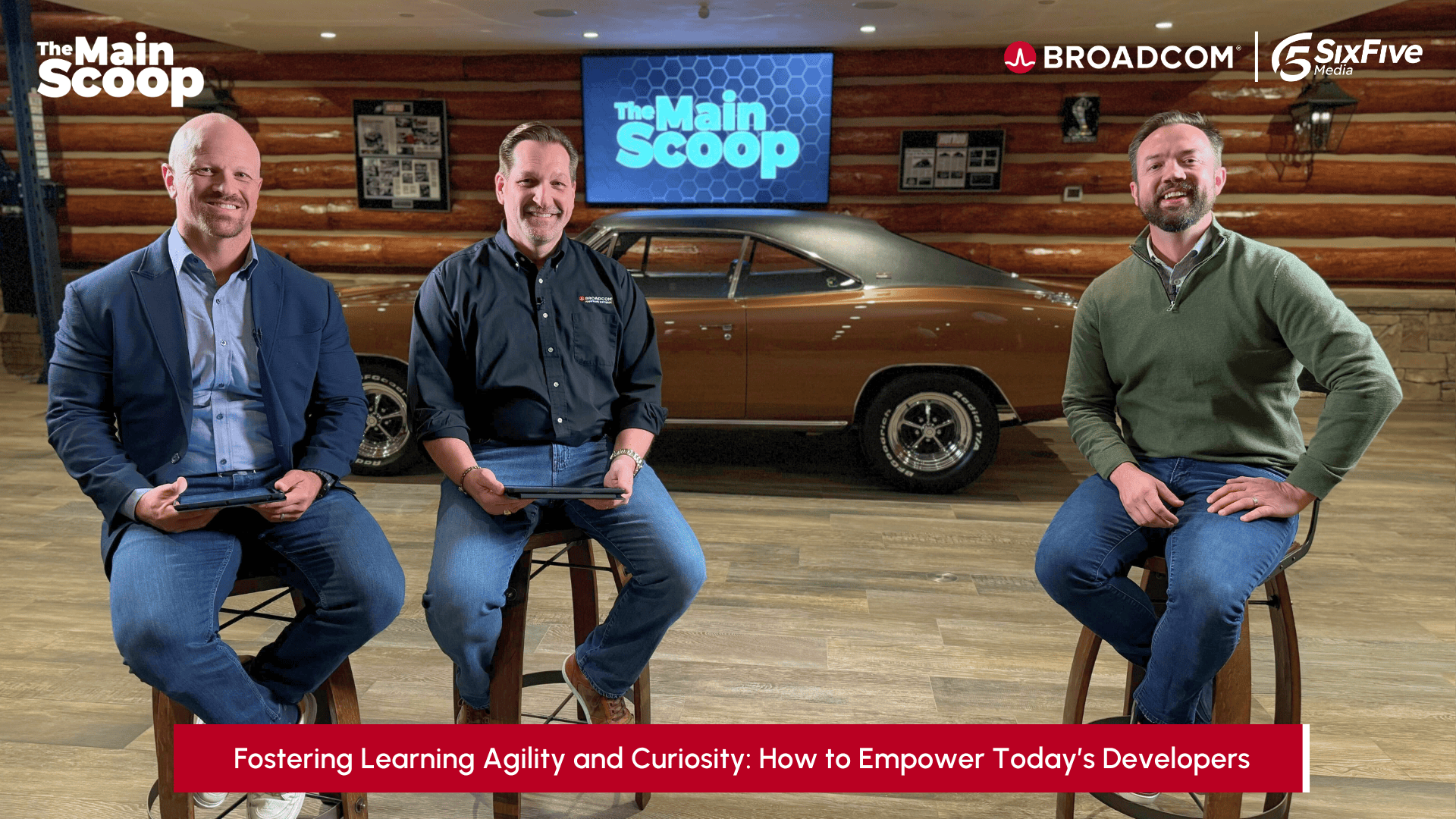
The Main Scoop Episode 39: Fostering Learning Agility and Curiosity - How to Empower Today’s Developers
Brent Foster, VP and Engineering Practice Owner at TD Bank, joins The Main Scoop hosts to discuss developer empowerment through generative AI, the modernization of mainframes, and building strong technical career paths in evolving enterprise IT.
Other Categories
CYBERSECURITY
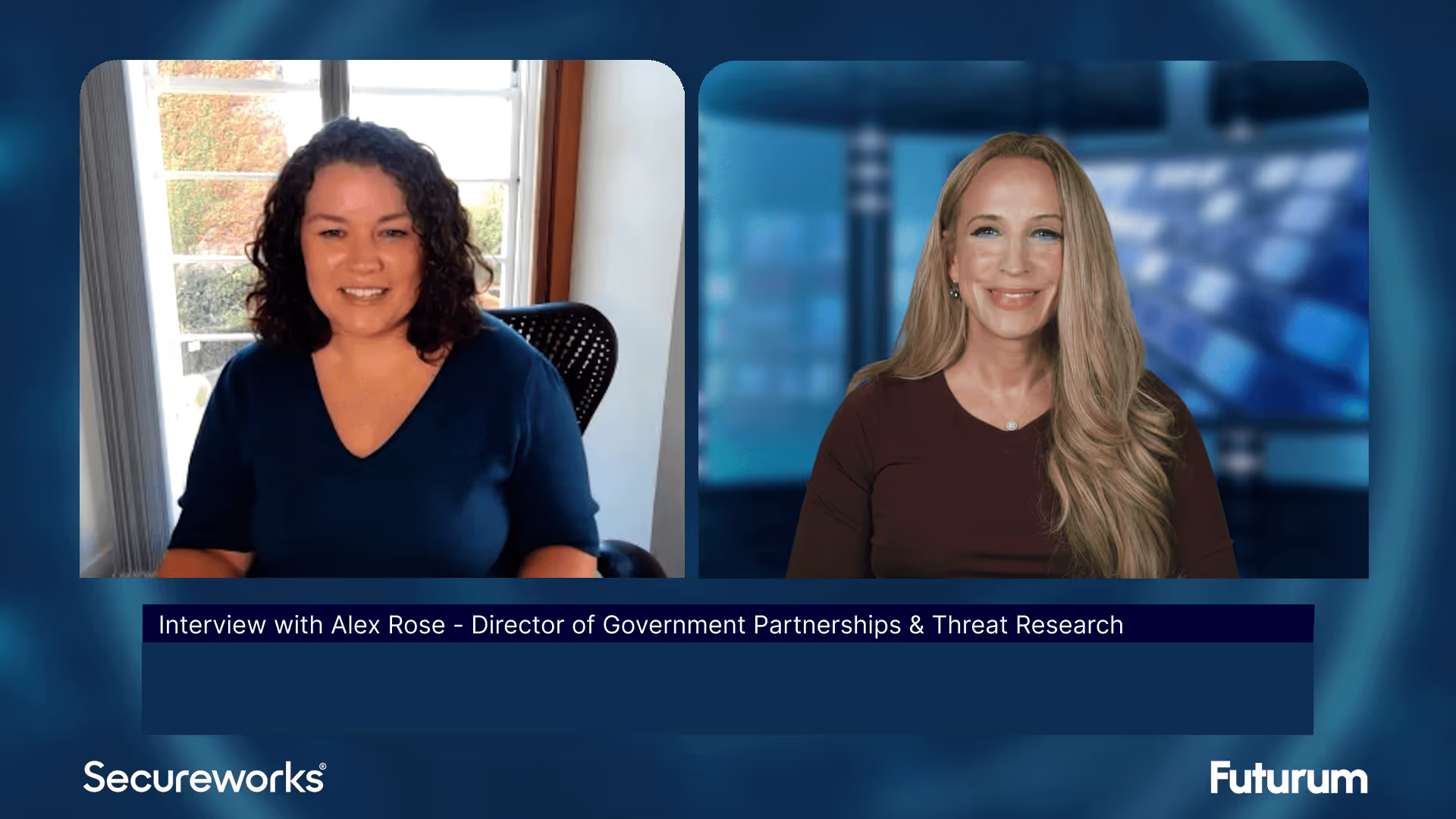
Threat Intelligence: Insights on Cybersecurity from Secureworks
Alex Rose from Secureworks joins Shira Rubinoff on the Cybersphere to share his insights on the critical role of threat intelligence in modern cybersecurity efforts, underscoring the importance of proactive, intelligence-driven defense mechanisms.
QUANTUM
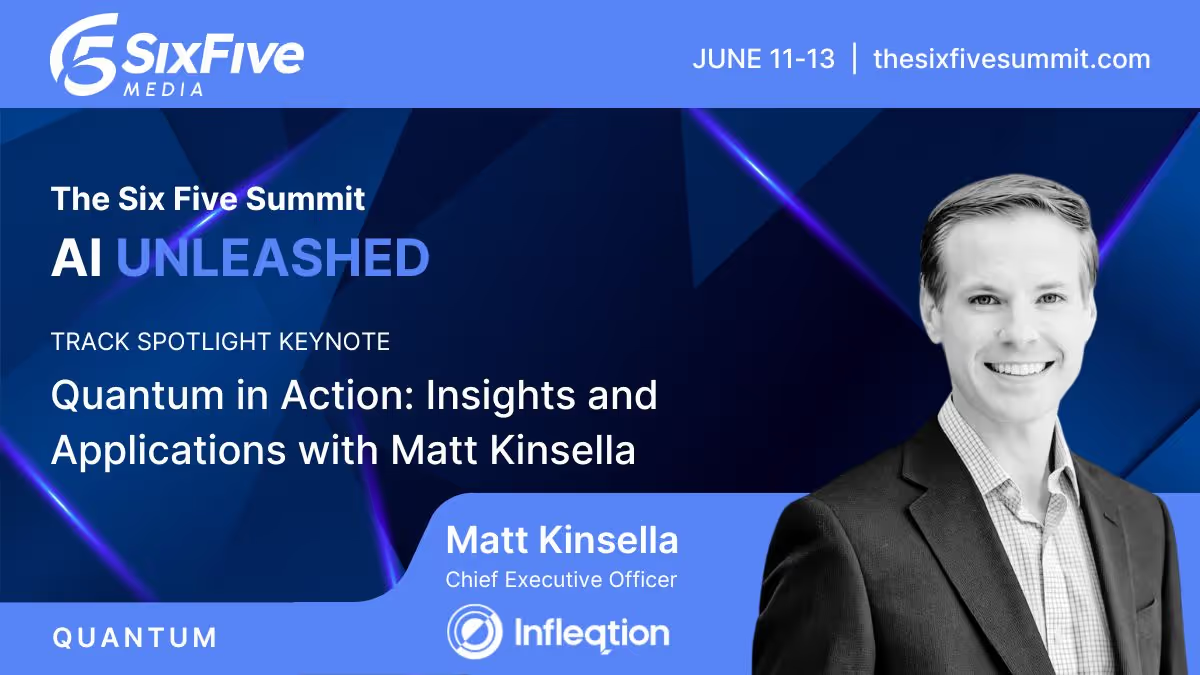
Quantum in Action: Insights and Applications with Matt Kinsella
Quantum is no longer a technology of the future; the quantum opportunity is here now. During this keynote conversation, Infleqtion CEO, Matt Kinsella will explore the latest quantum developments and how organizations can best leverage quantum to their advantage.
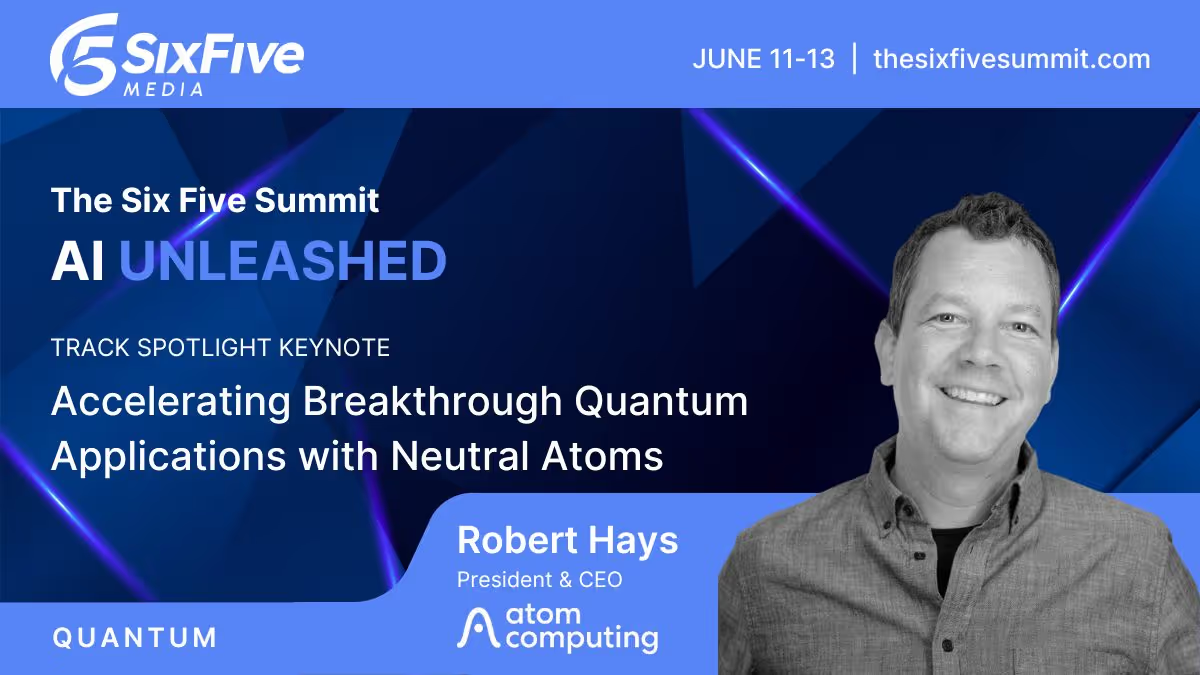
Accelerating Breakthrough Quantum Applications with Neutral Atoms
Our planet needs major breakthroughs for a more sustainable future and quantum computing promises to provide a path to new solutions in a variety of industry segments. This talk will explore what it takes for quantum computers to be able to solve these significant computational challenges, and will show that the timeline to addressing valuable applications may be sooner than previously thought.




